By Charlene Muhammad CHARLENEM
Related news:
‘Beating grandmothers in the street’
One-on-One Interivew: ‘That video was what the video caught’
LOS ANGELES (FinalCall.com) – There is no sound but you almost hear the thud of blows landing on a Black woman pinned to the ground by a bulky California Highway Patrolman. You can almost feel the woman’s head bouncing off of concrete as an unstoppable force smashes into her face.
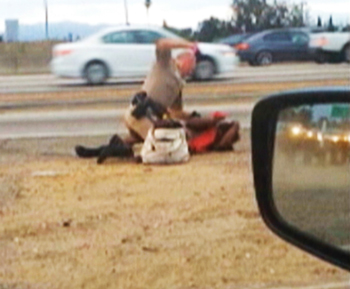
Those images brought an explosion of outrage from the woman’s family, family attorneys, leaders, politicians and grassroots activists.
Each weighted punch has contributed to demands for accountability and transparency. They want the officer fired and charges filed against him. They want a federal investigation. They want justice.
“I feel like in general there’s this escalation of attacks on our Black people, but not just us, also the Latinos as well, and we have to become really serious about organizing self-defense for our people and organizing different ways to get this government to monitor and enforce standard human rights around these issues,” said Sanyika Bryant, of the Malcolm X Grassroots Movement, which has written reports on the continued problem of police brutality.
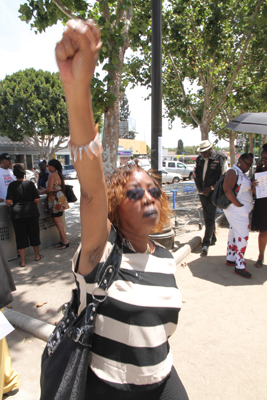
The woman was later identified as Marlene Pinnock and lawyers for her family were blunt: “When you look at it and you see it’s a White police officer, a big male police officer and a Black female, you wonder whether there was a sub consciousness that she did not matter because she was a Black female?” asked Atty. John Burris, who represents the family.
“Here it should be a no-brainer. He should go to jail,” added family Atty. Caree Harper. (See related interview with Atty. Harper)
In a series of private meetings, press conferences and rallies, activists condemned the July 1 assault on the 51-year-old mother, grandmother and great grandmother–who is reportedly mentally ill and homeless–along California’s 10 Freeway.
Ms. Pinnock is very physically bruised and very emotionally traumatized, said Atty. Harper during a July 10 press conference in front of the Los Angeles Sentinel newspaper. She stood with Ms. Pinnock’s sister, daughter, son-in-law, civil rights lawyer Burris, Sentinel publisher Danny Bakewell, Sr., and community leaders and activists.
Atty. Harper also spoke during a Saturday rally hosted by the National Action Network at Leimert Park on July 12.
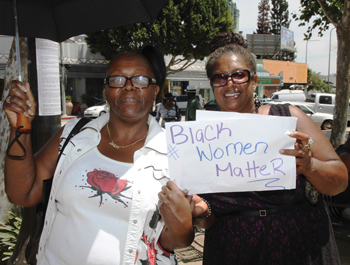
Atty. Harper argued it shouldn’t have taken two press conferences for Ms. Pinnock to receive a CAT scan when video shows her face was being pounded into the cement. If the officer had suffered that kind of brutality, he would have gotten the X-rays within hours, she said.
“They would have escorted the ambulance to the hospital and all lined up for that officer and we say Ms. Marlene is loved, and she should have been treated like a human being,” Atty. Harper said.
The victim has received substandard medical care and there’s enough room in the lawsuit for doctors and the hospital, if they continue the poor treatment, she warned.
Ms. Pinnock is further traumatized because the hospital has been allowing footage of her beating to be played in the day room where she’s being involuntarily held, Atty. Harper added.
It almost took a day to find Ms. Pinnock because the hospital hid her under a number of aliases, the attorney charged.
“They had her listed under a male name, under a numeric value, under a first name that she has never gone by,” Atty. Harper said. The hospital was trying to give time for Ms. Pinnock’s bruises to heal, she said.
“But some bruises can’t heal that quick when you beat a woman like that. When you beat her down like that, those bruises did not heal because the daughter observed lumps to her mother’s body, her shoulder. When she tried to turn over and protect herself, there are lumps and you can even move it with your hand. There are lumps in her head. There are lumps to her shoulder,” Atty. Harper continued.
Instead of asking why Ms. Pinnock was walking on the freeway, the question is why did the officer punch her so many times? the attorney added.
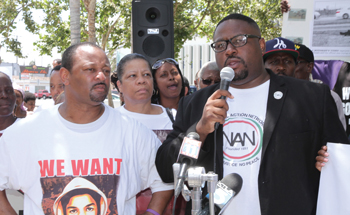
Who will investigate the investigators?
Rep. Maxine Waters and Rep. Karen Bass have written letters requesting a federal probe by the Justice Department. Both are Black women, Democrats and represent Los Angeles.
“There is nothing that can justify the officer punching a helpless woman on a freeway,” Rep. Waters said. “This type of police brutality happens too often with African-Americans and we have seen it time and time again. There are those who should know by now that we will not keep quiet when incidents like this occur.” Her statement was issued July 9.
Congresswoman Bass told The Final Call she was horrified watching Ms. Pinnock try to protect herself. It was hard to see how she was a threat to anyone, added the lawmaker.
“And frankly, you know in terms of the L.A. police department and even the Sherriff’s Department, you know there are certainly still issues, but it is nothing like it was in ’70s, ’80s and ’90s and so that was a throwback,” Rep. Bass said.
She expressed hope that the California Highway Patrol would respond properly to the brutal assault by the still unnamed officer.
Allowing the agency to investigate the incident and accepting those findings is tantamount to hiring the fox to guard the chicken coop, and the community knows better because it’s happened before, Danny Bakewell said.
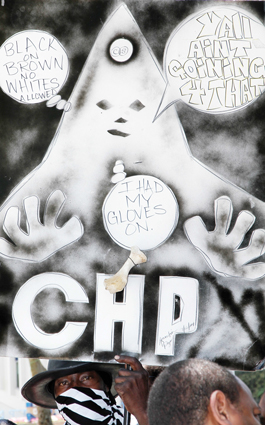
“This time it’s a Black woman. Last week it was a Black man. Last week it was our son, and we want to make sure that next week it’s not us,” he said. There is no belief that the highway patrol can investigate itself fairly, Mr. Bakewell added.
The beating has hurt confidence in the criminal justice system but what would have happened without the video? asked Mr. Bakewell, a longtime activist and businessman.
Generally law enforcement investigations of excessive force have found the conduct of officers was justified or in accord with department policy. Law enforcement personnel in California are also heavily protected by the Officers’ Bill of Rights during investigations.
The law is used to shield rogue cops from justified disciplinary action, activists complained.
“That’s one of the reasons we don’t know that officer’s name. That’s why we haven’t seen the officer. He’s been taken out of the system,” said Mr. Bakewell.
Unlike the public, officers get a cooling off period before any interrogation, even from within their departments.
“Can you imagine what story you can concoct if you had 10 days after you do something? That’s why they apprehend you and put you in a cell. One person’s talking to you over here. If you have a comrade they put him in another cell, and they get the story right on the spot,” Mr. Bakewell noted.
When The Final Call requested a copy of the police report from the July 1 highway incident, Robert Meyer, California Highway Patrol public information officer, said the report was still being written. Getting a copy of what should be an immediately available public document will require a discovery request from the District Attorney’s Office, he said.
According to Atty. Harper, the highway patrol has been distributing to media some aspects of an initial police report, which was completed before the agency realized a videotape existed.
But while the report isn’t available, the California Highway Patrol is promising a quick investigation “measured in weeks,” said Officer Meyer in a phone interview.
Culture of police brutality?
The Black community’s police battles have pushed reforms in the LAPD and the Sheriff’s Department, but the California Highway Patrol has slid by, according to Mr. Bakewell. It’s all a part of the culture in law enforcement that says dealing with Black people means dealing with a less valuable life, he said.
According to the Malcolm X Grassroots Movement’s “Operation Ghetto Storm” report, there were 313 extra-judicial killings of Black people by police, security guards and vigilantes last year.
Sanyika Bryant, an organizer with the group, said a national plan of action is needed now. The Coalition Against Police Abuse, founded by deceased Black Panther and anti-police brutality activist Michael Zinzun, and Dignity in Power, which exerts political pressure to end violence by L.A. County Sheriffs, have good models, he said.
Momentum for justice
Ms. Pinnock’s attorneys plan to keep her story alive and combat media attempts to try the victim in newscasts and news pages before the officer is tried. “It’s important that the demonization of her does not occur. If he was trying to protect her and to put her in a safe environment, he had a hell of a way of trying to do that,” stated Atty. Burris.
Atty. Harper warned against any police efforts to discredit David Diaz, who recorded the infamous video and released it to the press. (See special one-on-one interview.) Three other witnesses were in his car, she said.
“We want (witnesses) to keep coming forward. We don’t want you to be scared of retribution from the police, although we do know that happens sometimes,” Atty. Harper said.
Righteous indignation
“The Final Call needs to know that the SCLC believes that none of our queens need to ever be treated like that by CHP,” said Pastor William D. Smart, president of the Southern Christian Leadership Conference L.A. chapter. “And let me take it further! That’s by the LAPD, that’s by the county sheriffs, and that’s by husbands.”
He was among several civil rights leaders who met with California Highway Patrol Commissioner Joseph Farrow on July 7.
Some expressed concern the agency would use civil rights leaders to lull the community to sleep and quell anger. Immediate action was needed and the highway patrol was told the beating would not be swept under the rug, the civil rights leaders told the Final Call.
“I really believe that was the purpose of the meeting, to voice that they’re (California Highway Patrol) in control,” said Rev. K.W. Tulloss, of the National Action Network Los Angeles chapter.
“This is their first visible black mark that we’ve seen, but in that, I informed the CHP commissioner, this is your first visible mark that we’ve seen, but there are others that have complained and at the end of the day, this sister who’s lying in the hospital somewhere, has been beaten up and violated by one of your officers and we won’t rest until justice is served,” said Rev. Tulloss.
Respect, protect Black women
“Once again, in the face of it being recorded, we are seeing the effects of White supremacy and the devaluing of Black life,” said Student Minister Tony Muhammad, the Nation of Islam’s western region representative.
In a moment, people will be told what they see on video is an illusion, he predicted. But if media wants to dredge up Ms. Pinnock’s past life to downplay the egregious attack, the focus should be on what caused her to be homeless and mentally ill, said Mr. Muhammad, who is based in Los Angeles.
Minister Louis Farrakhan of the Nation of Islam, in a powerful series of messages titled “Justifiable Homicide: Black Youth in Peril,” observed how law enforcement agencies rule justifiable homicide in police brutality cases and the court system rules against victims and families who dare seek justice.
“No matter what was done by White people to set the Black man at naught was excusable, because anything that was done to us to maintain White supremacy was in fact an unwritten law,” he said.
“The killing of every Black human being during the 300 years of chattel slavery and even now, 150 years up from slavery, at the hands of White people is generally considered excusable.”
The beating is not just a California issue, but a national one, said Cynthia McKinney, a former U.S. congresswoman and former Green Party presidential candidate.
“Black women have always been under the guns of White supremacy as part of the legacy of slavery,” commented Ms. McKinney. “A White man could beat a Black woman like that with impunity in exactly the same way that that woman was beaten in public. That encapsulates the 200 year history of slavery in the United States (in) that video,” she said.
Last year in California, Alecia Thomas, a Black woman died after a female officer kicked her in the stomach and groin during an arrest.
Eula Love was killed in 1979 by officers under then LAPD Chief Daryl Gates’ regime. She was shot numerous times after officers responded to calls she assaulted a utility man attempting to collect a $22.09 payment on her $69 gas bill. The acquittal of officers videotaped beating motorist Rodney King led to unrest and violence costing $1 billion in 1992. Fifty people died and thousands were hurt during the rebellion.












